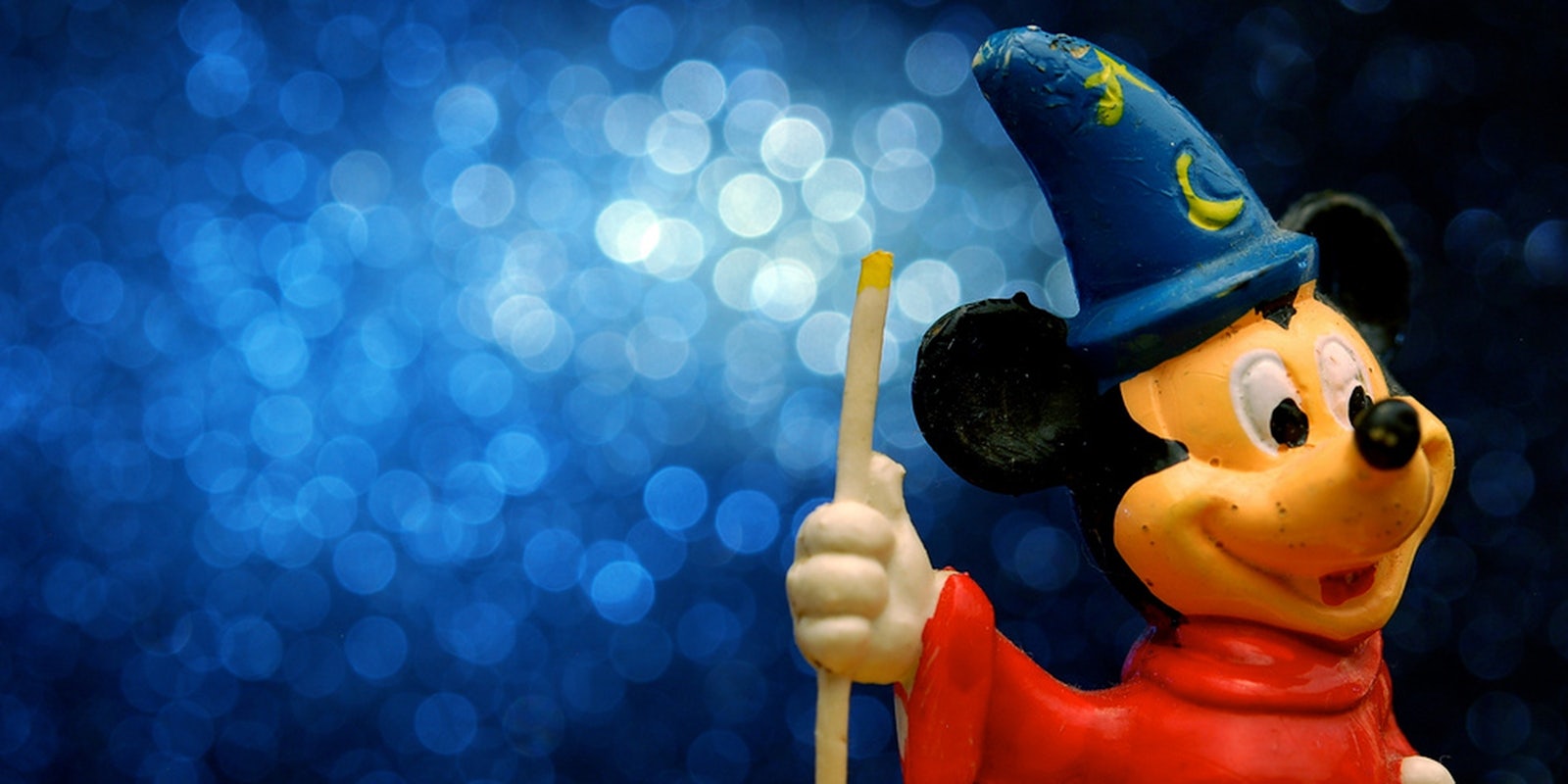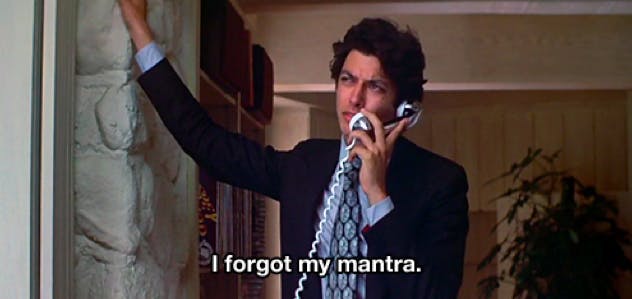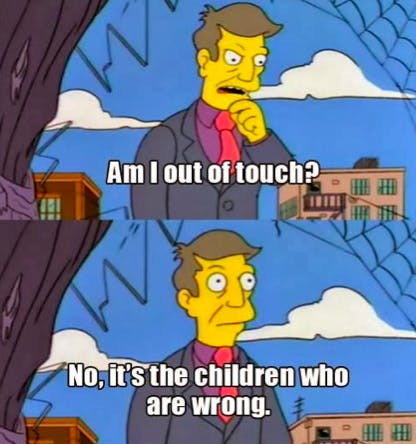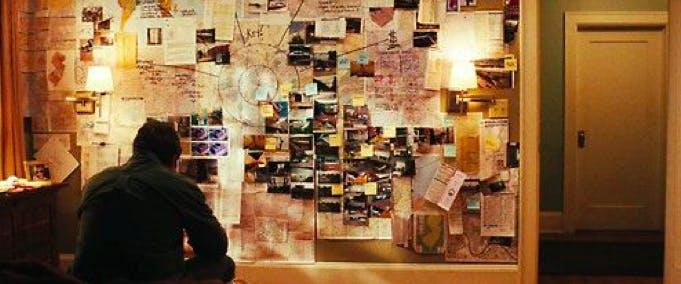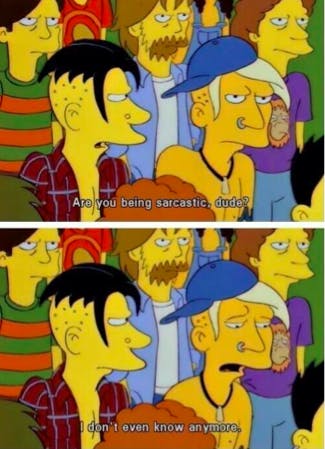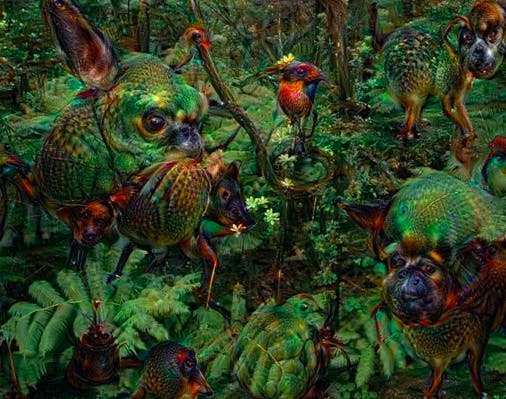The most efficacious cameos in cinema is Jeff Goldblum’s in Annie Hall. Portraying a hollowed-out Hollywood hedonist, it takes only four words of dialogue, spoken to an unknown listener on the phone line, for the audience to understand this the rubrics of Goldblum’s character:
On Sept. 14, 2015, the alternative consultancy group K-Hole announced their latest trend, “Chaos Magic,” heralded via their publication of A Report On Doubt and a follow-up interview with Vogue. Having previously valorized the much debated and oft-misunderstood notion of Normcore, K-Hole has now moved on to avow magic—in the form of self-determination, self-belief and “bargain basement positive thinking”—as the new paradigm-defining explicator of contemporary experience.
K-Hole’s Emily Segal to Vogue:
“Normcore itself became a kind of maxed-out signifier… I think where we found ourselves was thinking, ‘Where do you go from here?’ That’s where magic comes in. It’s not necessarily spells and witches, it’s more the spiritual sort of magic. It’s the kind of magic that just happens, that allows people to stop over-thinking and over-analyzing things.”
Though messages of self-belief and positive thinking can be read as constructive, I could not deny that my experience with A Report On Doubt left me feeling abidingly sullen, uncertain and decidedly muggle-like. “This is it,” I fretted. “The universe is expanding, and nothing means anything anymore!” I needed a sustaining mantra quick-sharp.
What was it about the report and its subsequent coverage that made me suspect that a large swath of western culture is only alive in the sense that it is necrotizing?
“Genericide happens when the sheer linguistic power of a brand overwhelms it, causing it to turn itself into a viral entity.” –K-Hole
Firstly (and putting aside the significant problems intrinsic to an advocation against critical thinking when addressing a readership of agents within industrialized, consumerist societies), how can it be that Normcore—that which was defined by its indistinction—has somehow maxed out? Is norm- actually normal (as in, bad-normal) again? How can a lifestyle creed—not a mere fashion aesthetic—become defunct so soon? I paid my tithes at Superdry, thank you very much, you can’t take this away from me.
And if Normcore is over, how am I supposed to believe in Chaos Magic so soon and all? I must be at a grief stage, somewhere between denial and pain, because it almost seems as though the vagaries of Chaos Magic allow subscribers to arbitrarily pin ~certain lifestyle choices~ and ~material desires~ to a pre-existent framework (namely the eponymous late 20th-century practices of Chaos Magic), moving through ideologies like hyperlinks on Aleister Crowley’s Wikipedia page.
The sober reality is that the meanings detected lean toward self-referentiality and solipsism, and are likely to be erroneous. A Report On Doubt itself is full of anecdotes and references to personal experiences. Perhaps the document is responsive and speaks to K-Hole discretely. Inversely, it could be a cynical production, tuned to resonate with an demographic that finds the premise enticing and gratifying. Such a group may be tempted into co-option, spending their cash as an initiation rite.
As I read about Chaos Magic being a “radical DIY that uses reality as the only necessary operating system” I perceived the tonal inflections modulated by arch-irony. I was suspicious. I would rather our complex reality be less obfuscated, and remembering Natalie Kane and Tobias Revell’s excellent Haunted Machines project, began to realize how deeply I object to the magical language of myth-making being proposed. The news that Whitney Houston will be the latest dead entertainer to complete a worldwide tour drifts to mind—I read about it on my black-boxed device—and I know that isn’t really the magic K-Hole are referring to, though suspect that experiences with the holographic dead inform the doubt that this trend will no doubt capitalize on.
Perhaps that is a skeptical reading. Perhaps the forecast was discerned in good faith, or, at least, as a byproduct of a sincere delusion. Apophenia perhaps—the human tendency to perceive meaningful patterns within random data. K-Hole refer to pattern recognition as a means of reading the world: “When you’re a baby, things are constantly appearing out of fucking nowhere and vanishing with no hope of return, until at some point you learn pattern recognition.”
But I think more of Klaus Conrad’s “Apophänie,” the perception of “unmotivated… connections” accompanied by a “specific experience of an abnormal meaningfulness,” which describes the onset of delusional thinking in psychosis. Those in the throes of a apophenic episode are not then privy to any singular insight into the nature of reality or its interconnectedness but rather in a “process of repetitively and monotonously experiencing abnormal meanings in the entire surrounding experiential field.” This is how drunk epiphanies happen, too: A short-circuited brain shuts out the fuzz of reason and convinces you that the universe wants you to send that sext.
Jorge Luis Borges’ Library of Babel imagines the universe as a vast library wherein information overload has rendered the contents of its books devoid of context; meaningless. This leaves some librarians suicidal. Others become superstitious and ritualistic. Some conclude that since all books exist in the library, one of the books must be a perfect index of the library’s contents; some even believe that a messianic figure known as the ‘Man of the Book’ has read it—and they travel through the library seeking him.
This is a tale of a search for meaning, structure, and order, and for our age it’s a story that resonates powerfully as meaning-making practices are fought over in a world teeming with exploded context, multitudinous critical perspectives, commentary and analysis on the modes of facile engagement online communications afford, from fraud to trolling. An avatar is an edit by definition, bearing and deploying selected, culturally loaded symbols at will. In some essential terms this doesn’t differ from the various modes of symbolism adopted when offline, yet as a medium, the Internet has facilitated an accelerated devouring of viable fodder. All is fair game, unless you get called out (MILEY, WHAT’S GOOD?).
Normcore and Chaos Magic actually seem to have a lot in common. Both are guides on negotiating lived experience, and both speak on the nature of authenticity, albeit of a type gained through material means and augmented by gains of the spiritual kind. Both Normcore and Chaos Magic are about identity asserted via the absolute terms afforded by a manifesto, or dogma—a framework, essentially. Both are ultimately conservative.
Yet in the depths of what seems like rudderless post-post-modernism it’s possible to see a facile rehashing of [insert as appropriate]-lore gaining traction. Perhaps Chaos Magic is ripe for the picking. Magic has long appealed to the rich, the famous, the bohemian; those seeking alternative structuring to bolster the terms of a lived experience no longer explainable by the domestic idyll of the middling classes and their tawdry gods. And this is no criticism of postmodern magic belief systems, or even religion. Rather, this is a consideration of the very act of framing lived experiences in those codified terms so readily, and so explicitly on the nose of a trend.
Borrowing endlessly to construct an identity is, aptly enough, a principle true to the original Chaotic-Magical dogma, which as a practice borrows liberally from other belief systems in asserting that belief is a tool. It’s as self-aware an ideology as they come. As K-Hole reframe it, “Chaos Magic isn’t just believing in The Secret, it’s deciding to believe in The Secret to begin with.” And here is where the issue of buying in comes to the fore; let’s not forget that trend forecasting can prove a profitable enterprise, and any trend forecasters worth their salt will be somehow aware of cultural mood and temperature, based on some alchemical recipe of current events, news, politics, and the whispers of shadowy focus groups.
The onset of cool-hunting and, to compound things further, the increasing speed with which trends are excitedly received, adapted, adopted, and commented on—before being left to recede or become recursively meaningful—couches “magical paradigm shifting” as something more meme-like than a determinate brand stratagem. This is exactly what K-Hole wants, for a variously interpretable message is never incorrect.
“The fuzzy uncertainty that floats around the idea of magic is more important than a slapdash explanation of how magic works.” —K-Hole
There are perhaps two main channels via which the message K-Hole’s reports can be received and interpreted—on the high street at face value, and collaboratively within media narratives. In the latter: any message discerned informed not just by the report alone, but by reactions to the report, the products inspired by the report, and the discourse surrounding said products. In that context, A Report On Doubt’s constitution is decidedly meme-like. Memes, after all, should be thought of less in formal terms (i.e., meme series or types, such as image macros, Pepe the Frog, Rage Comics, etc.) but rather as a set of indeterminate, fluid, communicative practices, proliferating within social groups in the same way that localized dialects do; they tell stories on multiple registers, are subject to divergent interpretation, and allude to culture via riff and remix.
Memes, too, like fashions, can be insidery and exclusive; expert creation, deployment, and remixing can indicate social status (useful within anonymized online forums). Overuse without irony gets you into Mom-Facebook territory where memes, without market intervention, can die a peaceful death. Daniel Keller, in a recent piece for Spike, reflected on Google’s Deep Dream program and the trippy #puppyslug filter meme it spawned, going on to speculate as to how and why visual memes can so quickly go from “mindblowing to lame.” Coding #deepdream’s aesthetics as psychedelic, Keller compared its popularity to the short-lived trip brought on by “Changa, a relatively new mixture of DMT-infused smokeable herbs…DMT is the perfect spectacle-intense, no-risk, TV-ad length trip for the on-the-go ADHD YUCCIE who ‘ain’t got time for that.”’ Comparing the speed with which both #deepdream and changa are consumed and expended, Keller points out that “the main similarity between #deepdream and hallucinogens is how predictable and hollow their ‘deep lessons’ become after experiencing them a few times,” a process he calls “novelty decay.”
As reported, #deepdream aesthetics are themselves fundamentally determined by pattern-recognizing neutral networks. We train machines to learn in this way. And the human or human-taught habit of determining false positives, like the puppyslugs, is really the nub. Be it Magick, fashion doctrine, faddish dabblings in Kabbalah, immersion in Scientology, Cosmic Ordering, psychic phone-lines, Chaos Magic, Magical Thinking, adherence to social codes on Reddit, your library card, family dinners, anything defined as or by an ontology-come-ideology—patterning is recognizable, and when recognized becomes meaningful. And as the recent discovery of our Homo Naledi ancestors seems to imply, the capacity to ritualize and believe anything is of evolutionary benefit in the face of eternal bleakness.
Yet again, and once more setting aside questions of how brand-grandizing trend forecasting symbiotically present within industrial-capitalist systems can ever be redeemable, it is the pernicious questionability of the vapid, rapid, maniacal “now this”-ness implicit in any trend report we are up against. And to speak again in term of apophenia, a willing acceptance of arbitrary frames of references smacks of mass psychosis.
I return again to Annie Hall, which once taught me that one should only look directly into nihilistic chasms with caution, or else be overwhelmed by existential inertia. The cognitive dissonance that comes with any attempt to reconcile sensed experience of a life lived on a local level with abstracted knowledge of our existence on a cosmic one is (until we inevitably welcome our AI overlords) something humans have been coming to terms with via storytelling, folklore, and magic for eons.
As Keith Thomas wrote in Religion and the Decline of Magic: “If magic is to be defined as the employment of ineffective techniques to allay anxiety when effective ones are not available, we must then recognize that no society will ever be free from it.” Picking up on persistent insecurity and anguish can pay dividends—ask any TV psychic or miracle-working stadium evangelist. Orson Welles once explained that cold reading comes with an occupational hazard: Both psychic and client can become convinced in the caprice. So when in doubt, it’s worth being mindful of how readily magic can be perceived amongst the chaos.
Photo via JD Hancock/Flickr (CC BY 2.0)

